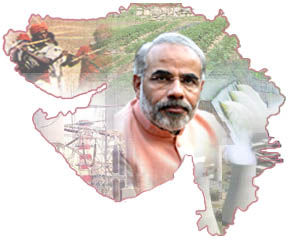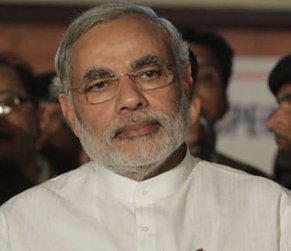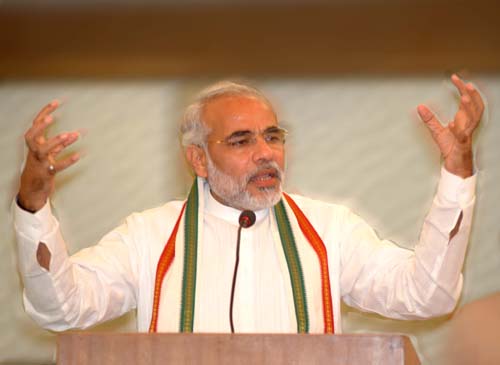Narendra Modi's long haul

OLD-FASHIONED caste seems to be making a comeback against new-fangled Hindutva on Gujarat's retrograde political stage. By appealing along caste lines, newly-appointed Congress(I) president Shankarsinh Vaghela has called the wily Bharatiya Janata Party Chief Minister Narendra Modi's bluff. Even in communally polarised Gujarat, caste ties seem to be stronger than communal biases, judging by the response to Vaghela's rallies in the past month.
Vaghela's aggressive caste mobilisation scared the BJP. It was forced to postpone its much-touted Gujarat Gaurav Yatra once again. The threat of a violent face-off with Vaghela's supporters in Phagvel village made Modi run for cover. The BJP was asking for trouble when it decided to flag off its Gujarat Gaurav Yatra from the Bhattiji Maharaj temple in Phagvel village on September 3. Phagvel lies in Vaghela's Lok Sabha constituency in Kheda district. Moreover, the village is dominated by the aggressive Kshatriya community, which forms the backbone of Vaghela's mass base.
By challenging Vaghela on his own turf, the BJP got more than it bargained for. Vaghela used Kshatriya caste loyalties in Phagvel to sabotage the BJP yatra. His supporters, organised under the banner of the Bhattiji Sena, invited him for a parallel religious meeting in the temple on the same day as the Gaurav Yatra was planned. Kshatriyas threatened that they would not allow the BJP elements to enter the temple. Platoons of the police were posted on the roads leading up to the village. Trouble seemed inevitable. Rather than face a hostile crowd, Modi preferred to cancel the event. Vaghela's mission to railroad the yatra had succeeded.
This was just the start of a dirty election campaign in Gujarat. The BJP is aggressively playing on communal sentiments. But Vaghela, a former BJP and Rashtriya Swayamsevak Sangh leader, is out to beat Modi at his own game. While his strongest appeal is to caste ties, he is not allowing the BJP to monopolise Hindu rhetoric either. His mass base is the strongest among Kshatriyas, a community in the OBC (Other Backward Classes) category. Kshatriyas form around 20 per cent of the State's population. Although Modi is from the Ghachi community, also an OBC, he does not have a mass following amongst OBCs.
Vaghela is also playing on the traditional rivalry between Kshatriyas and Patels, the dominant castes in Gujarat. Patels, who support the BJP, form 20 per cent of Gujarat's population. Most Patels are loyal to former Chief Minister Keshubhai Patel, who is currently at loggerheads with Modi and reluctant to campaign with him. Vaghela is capitalising on this discord. "Kshatriyas are actually a political caste," says Achyut Yagnik, a social activist. "Rajputs (who comprise 5 per cent of the population) aligned themselves with the Kolis (an OBC which forms around 20 per cent) in order to counter the rise of Patels. They formed the Kshatriya Mahasabha in 1942. This led to the spread of Kshatriya consciousness." When Vaghela was with the BJP, he mobilised Kshatriya support for the party. Now he is reclaiming their loyalty for the Congress(I).
This time, too, the Congress(I) is trying to use its KHAM formula (Kshatriya, Harijan, Adivasi, Muslim). This strategy proved very successful for the Congress(I) during the 1980 and 1985 elections. Since then, the BJP has managed to gain ground in Adivasi areas and amongst urban Dalits. Together, KHAM communities form a large chunk of the population. Muslims constitute around 9 per cent, Adivasis 15 per cent and Dalits 7 per cent.
Vaghela is also challenging the BJP at its own game by playing the Hindu card. He has garnered the support of religious leaders like the Jain muni Acharya Mahapragya who wrote to the Chief Minister asking him to call off his Gaurav Yatra to prevent further violence in the State. When the RSS mouthpiece Panchajanya recently praised Vaghela for remaining a 'patriot' and a 'swayamsevak' and for making 'shrewd moves', it came as a slap in the face for the BJP. Moreover, the Panchajanya article also praised Modi's main rivals within the BJP - former Chief Minister Keshubhai Patel and former Minister Haren Pandya. Vaghela is also using the Vishwa Hindu Parishad's traditional anti-cow slaughter slogans in his rallies. He is determined not to let Hindutva become the BJP's trademark. In his war against the BJP, Vaghela is managing to stonewall Modi at every step. His tactics are as aggressive as those of the BJP, and his rhetoric as caustic.
"Do they take pride in not being able to save the Ram sevaks at Godhra when they took votes in the name of Ram?" asked Vaghela at the meeting in Paghvel. That was a sarcastic reference to the BJP's attempts to highlight the Godhra incident during its election campaign.
The BJP has been on an advertising spree over the past weeks. Besides touting Modi as the best Chief Minister in the country, it is stoking Hindu insecurities. Across Ahmedabad the BJP has put up banners displaying a photograph of the Sabarmati Express burning, with the slogan: "Who is for us?" The 'Gujarat Gaurav Samiti' published advertisements that said: "Who is the Election Commission for? The minority. Who is the National Human Rights Commission for? The minority. Who is the Minorities Commission for? The minority. Who is for us?"
The BJP has also been using festivals to flex its Hindutva muscle. It was the Jagannath Rath Yatra in July. The Shobha Yatra was taken out on Janmashtami day, August 31. After that came the Ganesh festival. The Shobha Yatra, organised mainly by Sangh Parivar members in Rajkot, Modi's constituency, had the "Fight against Terrorism" as its theme. Several floats and exhibits had replicas of the Sabarmati Express burning. But there was no mention of those among the Sangh Parivar who orchestrated the killing of more than 1,000 persons after the Godhra incident.
Hindutva leaders now seem to be facing the backlash for their state-supported carnage. The Delhi police claim to have uncovered a plot to assassinate Modi and VHP president Praveen Togadia. On September 29, three youths, reportedly from the terrorist group Lashkar-e-Toiba, were arrested in Delhi. Later, two persons were nabbed in Ahmedabad.
The BJP has suffered setbacks on several other fronts. The Supreme Court dashed Modi's hopes for early elections. The court said that no elections would be possible until October 2 (see separate story). It would take until then for the Supreme Court to decide on the government's appeal against the Election Commission's order on elections in Gujarat. The BJP is worried that as the communal fever dies down, it will lose votes.
These fears have been corroborated by a recent survey conducted for the BJP by a Delhi-based market research company. It found that Modi's popularity has slipped since a similar poll was carried out in April. The Congress(I) is gaining ground, according to the survey. While in April the poll predicted that the BJP would win 118 of the 182 Assembly seats, the number slid to 96 in August. Contrary to the current political discourse, the main issues for the voters were employment, inflation and basic amenities, rather than Hindutva.
But the Sangh Parivar remains unrepentant. VHP international working president Ashok Singhal described Gujarat as a "successful experiment" and warned that it would be repeated all over India. At a recent meeting in Amritsar, Singhal jubilantly described how entire villages had been "emptied of Islam", and how whole communities of Muslims ran to refugee camps. This was a victory for Hindu society, he said, a first for the religion. "People say I praise Gujarat. Yes I do," Singhal said.
Yet, the communal campaign has not managed to deflect attention from the BJP's governance failures. Even in Phagvel, village residents spoke of the BJP government's neglect. "The Gujarat Gaurav Yatra isn't a matter of pride. In the last five years, the BJP hasn't done anything that it should be proud of. They haven't ever come here. Our panchayat hasn't got any development funds," said Rathod Dayabhai Abheshi, the Congress(I) sarpanch of Phagvel. Overnight, Abheshi became the most famous sarpanch in Gujarat as the national media hovered around Phagvel. Prominent politicians, including Modi, called on him, in an effort to win him over.
With Gujarat's economy on the downslide, basic survival issues are still the most important for voters. The entire State is classified as 'water-scarce'. The recent drought has worsened the situation. But the government has not yet started relief. Unemployment and insecure employment has become widespread as small-scale industries face financial ruin. Hikes in electricity rates have deepened the agricultural crisis. For the first time in Gujarat, around 25 farmers committed suicide in the last year in Sanand, Ahmedabad (rural) district alone (The Indian Express, August 14, 2002). In Ahmedabad, at least 10 suicides have been reported amongst families ruined after the carnage. "Modi is totally ignoring people's basic problems. Anyone listening to him would think that Gujaratis have nothing to do but attend yatras and religious festivals," remarks Martin Macwan, a Dalit activist.
The BJP's selective amnesia applies also to riot victims. It has chosen to overlook the misery of the 1.5 lakh people who were displaced by the riots.
After closing several relief camps and forcing people to leave, the government has doled out pathetic sums as compensation to rebuild homes. Some people are still rebuilding their houses with the help of charitable agencies. Others still have not been able to return to their homes or their jobs. In Ahmedabad alone, there are around 10,000 people still in relief camps, estimates Fr. Victor Moses of Citizen's Initiative, a group of non-governmental organisations (NGOs) working in the camps. There are hundreds of others in rural camps in Sabarkantha and Dahod districts that are shut officially but from where refugees have not left. "Refugees still feel insecure and uncertain. At a time when efforts should be made to heal the wounds, the elections are bringing out all the hate and mud-slinging," says Fr. Moses.
In the political race for the Hindu heart, Gujarat's real problems have been kept on the back burner. Moreover, Vaghela's divisive caste politics is likely to make the dominant castes even more empowered and aggressive. With such strong posturing going on, it is unclear how both the parties will get to mobilise the poorest sections of Gujarat's society, who also constitute a large vote bank. These parties are likely to face the brunt of the social discord that such politics is bound to generate. If only politicians would wake up sleepy towns like Phagvel for more constructive purposes, rather than for pujas and brawls!
 New Delhi, Feb. 7 : Gujarat Chief Minister Narendra Modi on Sunday praised Prime Minister Manmohan Singh and Union Home Minister P. Chidambaram for their bold initiative in tackling terrorism and improving the security scenario in the country.
New Delhi, Feb. 7 : Gujarat Chief Minister Narendra Modi on Sunday praised Prime Minister Manmohan Singh and Union Home Minister P. Chidambaram for their bold initiative in tackling terrorism and improving the security scenario in the country.
 Finally Nano rolled out but its not in West Bengal, rather it's in Ahmedabad, Gujarat.
Finally Nano rolled out but its not in West Bengal, rather it's in Ahmedabad, Gujarat. 
 According to the Chief Minister of the Gujarat State, Narendra Modi, the Ayodhya verdict will stands a catalytic agent for unity in the country. While the CM made this announcement when he welcomed the Ayodhya verdict and said that it now lends constitutional credence to the construction of Ram temple at the disputed site.
According to the Chief Minister of the Gujarat State, Narendra Modi, the Ayodhya verdict will stands a catalytic agent for unity in the country. While the CM made this announcement when he welcomed the Ayodhya verdict and said that it now lends constitutional credence to the construction of Ram temple at the disputed site. 
 Tehelka-CNN-IBN has decided to approach Supreme Court to look into the matter of godhra riots. Gujarat Chief Minister Narendra Modi has been asked several questions in the supreme Court for his involvement during the 2002 post godhra riots.
Tehelka-CNN-IBN has decided to approach Supreme Court to look into the matter of godhra riots. Gujarat Chief Minister Narendra Modi has been asked several questions in the supreme Court for his involvement during the 2002 post godhra riots.
